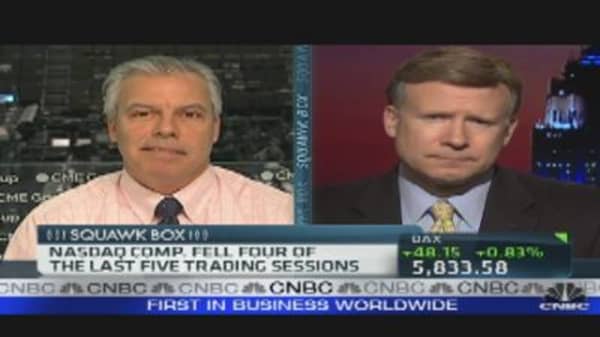Wall Street sold off sharply in the final hour of trade after the Federal Reserve delivered little hope that it would turn on the easing spigots anytime soon and as a formerly rosy holiday retail season suddenly turned gloomy.
Major averages closed just off their lows from the day in a selloff that began shortly after the Fed's Open Market Committee released its meeting statement shortly after 2. The red numbers accelerated into the close as banks and energy — leaders during a morning rally — turned tail and dropped sharply.
Financials lost 2 percent for the day as the worst performer in the Standard & Poor's 500, which saw nine of its 10 sectors post losses. Only utilities finished in the green as traders sold cyclical stocks.
Though the drop in the market seemed to coincide with the Fed's statement shortly after 2 pm, the move lower was multi-pronged.
Wall Street had few expectations for the Fed's final meeting of the year. But the somber tone and lack of indication that the central bank has more quantitative easing planned took the steam out of an otherwise quiet but steady rally.
"We anticipate that Fed officials spent most of the meeting continuing to discuss changes to their communication strategy, to be unveiled next year," Michael S. Hanlon, economist at Bank of America Merrill Lynch said in a note. "With the outlook likely to weaken throughout 2012 and inflation pressures to abate, we anticipate that early next year Fed officials will extend their commitment to exceptionally low rates into 2014, and will eventually embark on QE3 during the second half of 2012."
The market lost a morning surge after German Chancellor Angela Merkel again rejected any increases in the bailout fund for European sovereign debt.
The Nasdaq went into the red first as semiconductor companies continued to get hit and Amazon led a band of retailers, online and otherwise, on a downturn.
Macy's also was lower as fears grew that the Black Friday spending spree would be short-lived. Retail sales rose just 0.2 percent in November, well below expectations of 0.5 percent, according to an initial reading of pre-holiday activity.
Electronics merchant Best Buy reported earnings that were well below Wall Street expectations. The electronics retailer reported profit of 47 cents a share, missing its bottom-line expectations by four cents, while revenue was just below estimates.
The reading "suggests that the start of the holiday shopping season has not been half as strong as retailers’ spectacular Black Friday sales reports suggested," said Paul Dales, senior US economist at Capital Economics in Toronto.
An exchange-traded fund that tracks the industry, the SPDR S&P Retail , declined as it reflected the downbeat sentiment.
Pfizer led a small group of Dow industrials higher for the session, gaining sharply the day after the pharma leader raised its dividend by 10 percent and expanded share buybacks by up to $10 billion.




